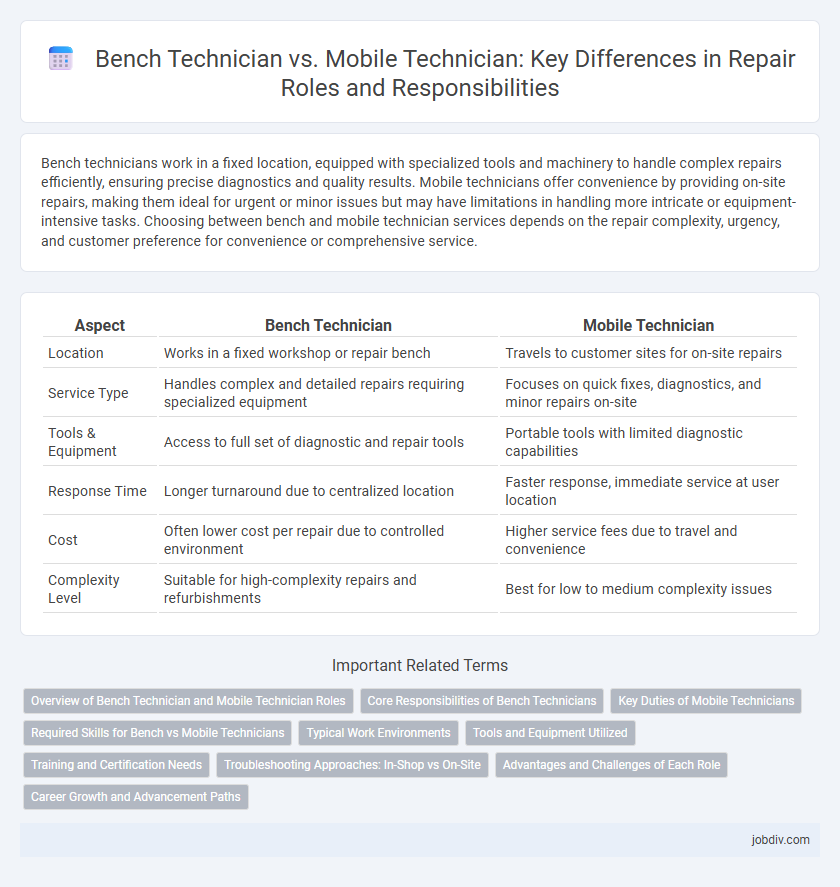Bench technicians work in a fixed location, equipped with specialized tools and machinery to handle complex repairs efficiently, ensuring precise diagnostics and quality results. Mobile technicians offer convenience by providing on-site repairs, making them ideal for urgent or minor issues but may have limitations in handling more intricate or equipment-intensive tasks. Choosing between bench and mobile technician services depends on the repair complexity, urgency, and customer preference for convenience or comprehensive service.
Table of Comparison
| Aspect | Bench Technician | Mobile Technician |
|---|---|---|
| Location | Works in a fixed workshop or repair bench | Travels to customer sites for on-site repairs |
| Service Type | Handles complex and detailed repairs requiring specialized equipment | Focuses on quick fixes, diagnostics, and minor repairs on-site |
| Tools & Equipment | Access to full set of diagnostic and repair tools | Portable tools with limited diagnostic capabilities |
| Response Time | Longer turnaround due to centralized location | Faster response, immediate service at user location |
| Cost | Often lower cost per repair due to controlled environment | Higher service fees due to travel and convenience |
| Complexity Level | Suitable for high-complexity repairs and refurbishments | Best for low to medium complexity issues |
Overview of Bench Technician and Mobile Technician Roles
Bench Technicians specialize in repairing electronic devices and equipment in a controlled workshop environment, utilizing advanced diagnostic tools and precision instruments to handle complex hardware and software issues. Mobile Technicians provide on-site repair services, offering timely diagnostics and solutions at the customer's location, which requires adaptability and immediate problem-solving skills. Both roles demand technical expertise, but Bench Technicians focus on in-depth, stationary repairs while Mobile Technicians emphasize mobility and customer convenience.
Core Responsibilities of Bench Technicians
Bench technicians specialize in repairing electronic devices in a controlled workshop environment, handling tasks such as diagnosing faults, replacing components, and conducting quality assurance tests. They manage intricate repairs requiring precision tools and extensive technical knowledge, focusing on circuit boards, hardware replacements, and firmware updates. Their core responsibilities emphasize ensuring device functionality before returning units, maintaining detailed service records and adhering to safety protocols.
Key Duties of Mobile Technicians
Mobile technicians perform on-site repairs, diagnostics, and maintenance for a variety of equipment, providing fast and convenient service directly at the customer's location. Their key duties include troubleshooting hardware and software issues, installing and upgrading systems, and conducting preventive maintenance to minimize downtime. Mobile technicians also manage customer interactions, ensure accurate documentation of service performed, and adapt solutions to diverse environments.
Required Skills for Bench vs Mobile Technicians
Bench technicians require strong diagnostic skills, proficiency in specialized tools, and the ability to perform intricate repairs within a controlled environment. Mobile technicians need excellent troubleshooting abilities, adaptability to diverse work conditions, and strong customer service skills to perform repairs on-site. Both roles demand technical expertise, but mobile technicians emphasize flexibility and communication while bench technicians focus on precision and detailed component analysis.
Typical Work Environments
Bench technicians typically work in controlled indoor repair facilities equipped with specialized tools and diagnostic equipment, allowing them to handle complex electronic or mechanical repairs with precision. Mobile technicians operate on-site at customer locations, requiring portability and adaptability to various environments such as homes, offices, or industrial sites. Each setting influences the scope of repairs, with bench technicians focusing on detailed component-level fixes and mobile technicians addressing immediate, on-the-spot service needs.
Tools and Equipment Utilized
Bench technicians typically utilize fixed, specialized tools and diagnostic equipment such as multimeters, soldering stations, and oscilloscopes within a controlled workshop environment. Mobile technicians rely on portable, versatile toolkits including handheld diagnostic devices, cordless power tools, and compact testing instruments to perform repairs on-site. The choice of tools directly impacts efficiency, with bench technicians excelling in detailed, complex repairs while mobile technicians prioritize mobility and adaptability.
Training and Certification Needs
Bench technicians require comprehensive technical training and certifications in electronics repair, diagnostics, and calibration to handle complex equipment in a controlled workshop environment. Mobile technicians need both technical credentials and additional certifications in safety protocols, customer service, and troubleshooting diverse equipment on-site, emphasizing adaptability and time management. Continuous professional development is critical for both roles to keep pace with evolving technology and repair methodologies.
Troubleshooting Approaches: In-Shop vs On-Site
Bench technicians utilize controlled environments and specialized diagnostic tools for comprehensive troubleshooting, enabling precise identification and repair of complex issues. Mobile technicians rely on portable diagnostic equipment and adaptable problem-solving skills to address issues on-site, prioritizing quick resolution and customer convenience. Both approaches emphasize efficiency but differ in resource availability and environmental factors affecting repair accuracy.
Advantages and Challenges of Each Role
Bench technicians benefit from a controlled environment equipped with specialized tools and spare parts, allowing for precise diagnostics and complex repairs, but require customers to bring devices to the service location, which may reduce convenience. Mobile technicians offer on-site repairs, providing faster service and greater customer convenience, though they face challenges such as limited tools, varying work conditions, and travel time. Both roles demand high technical expertise, but bench technicians excel in equipment-intensive repairs while mobile technicians prioritize flexibility and quick response.
Career Growth and Advancement Paths
Bench technicians typically have structured career growth within repair facilities, gaining expertise in diagnostics and component-level repairs that can lead to supervisory or specialist roles. Mobile technicians, who perform on-site repairs, develop strong customer service and problem-solving skills, offering advancement into field service management or technical training positions. Both paths provide opportunities for certifications and specialization that enhance career advancement in the repair industry.
Bench Technician vs Mobile Technician Infographic

 jobdiv.com
jobdiv.com